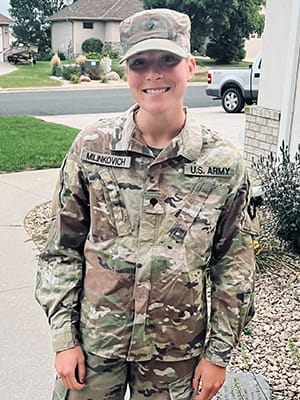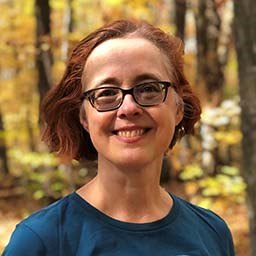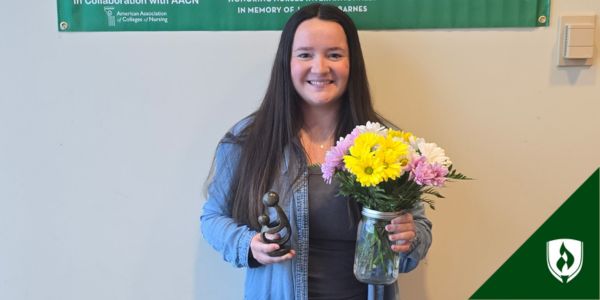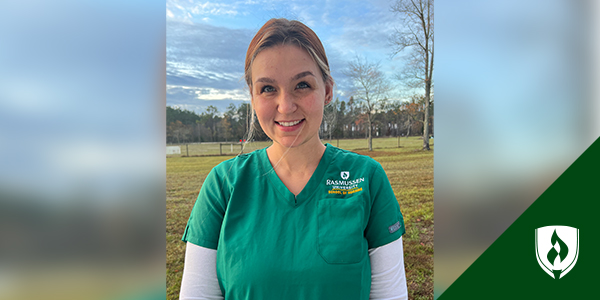Student’s Combat Medic Training Provides Foundation for Nursing School
By Sharon Rolenc on 10/14/2022
.jpg)
When Abby Milinkovich started college right out of high school, she struggled to find her place and was disappointed in the school she chose.
“I just didn't have the passion that I usually do for school. Normally, I love learning, but college just wasn’t doing it for me,” she says. “So I was like, what else should I do to better myself?”
She had several friends who were in the military, and they encouraged her to enlist.
“I thought, I’m young. I have nothing to lose, and the only thing that’s going to come from this is self-improvement,” Abby explains.
Military Service
Abby knew she wanted to be in a healthcare profession, so one of the deciding factors for her to enlist in the Army National Guard® was the opportunity to receive medical training.
Abby went through combat medic training at the Medical Education Training Campus (METC) at Fort Sam Houston in San Antonio, Texas, where she learned everything from assessing basic injuries and illnesses to treating combat trauma like gunshot wounds and injuries related to improvised explosive devices (IEDs).
“The coolest thing about the experience is that I got to learn the civilian side of modern medicine like your typical sicknesses and then also more serious injuries and problems that you would see if you were deployed in combat—so you see how they're all meshed,” says Abby.
After her training at METC, Abby earned a bachelor's degree in exercise science from another institution and considered advancing her education to pursue a career in physical therapy. But after experiencing a big injury and going through physical therapy herself, Abby decided that she no longer wanted to pursue that field. Instead, she felt nursing would better fit her passion for caring for people in a healthcare environment.
The Pathway Into Nursing at Rasmussen
With a bachelor's degree already in hand, Abby was anxious to get through a nursing program quickly. As she looked into nursing schools, Abby was attracted to Rasmussen University’s accelerated Bachelor of Science in Nursing program in Mankato, Minnesota, where she was living at the time.
“The people were nice and informative. I talked to a professor who was very helpful and engaged and really excited about the material, which is something I really like. If I’m really passionate about something, I like it when other people are passionate about it, too,” says Abby.
Another bonus to attending Rasmussen University for Abby was the ability to seamlessly transfer her credits from her METC Combat Medic Specialist Training Program. Her military joint service transcript included all her credits accumulated during her service.
“My admissions advisor gave me a checklist of things I needed to do to enroll. Between my other degree and my military service, I ended up having 62 credits transfer into my nursing program,” she explains.
The biggest challenge for Abby was trying to enroll while she was deployed to the Twin Cities for the trial of Derik Chauvin, the former Minneapolis Police officer who was convicted for the murder of George Floyd. Her admissions counselor reached out to help her stay on top of the process.
“I got activated for the trial and was gone for almost three weeks. But if you want something badly enough, you just need to do it. I started the process in April, and by June, I was enrolled to start classes in July,” she says.
Challenges, Sacrifices and Advice
Abby’s METC training proved instrumental in her early success as a Rasmussen University student.
"The training at Fort Sam [Houston] really helped me going into nursing school because it gave me a great foundation of knowledge. Since I have that medical knowledge, it helps me learn at a  deeper level in my nursing classes. I feel more confident in what I’m learning and how to apply it,” she explains.
deeper level in my nursing classes. I feel more confident in what I’m learning and how to apply it,” she explains.
That said, Abby is the first to admit that an accelerated nursing program is not easy.
“Nursing school is very, very difficult compared to my other four-year degree. It’s very fast-paced, which is something I signed up for, but I've definitely had to make some sacrifices and tell my friends, ‘No, I have to buckle down, study and do homework,’” says Abby. “You learn time management, and you learn your strengths and your weaknesses very early on so you can grow and develop and get better the next quarter.”
Abby’s advice to anyone considering an accelerated nursing program is to stick with it—even when the coursework and schedule feel the toughest—and remind yourself how much you want to be a nurse.
“When it gets so hard, and you feel like you’re failing, just remember that it’s all going to be worth it. Those challenges will only make you a better and stronger person, which will, in the end, make you a better nurse,” she advises.
The 2022 Winter quarter was particularly demanding for Abby, where she juggled a heavy course load with clinicals, numerous exams and paper deadlines. Going into the next quarter, Abby distinctly remembers the “Aha” moment when everything just clicked in place for her.
“It’s like I took all that knowledge into the next quarter and realized everything was so much easier. That was the moment where I really knew I could do this. I picked the right profession. And that felt so good.”
Abby suggests that nursing students reach out to faculty and staff for guidance when they need help.
“The faculty and staff are amazing and only there to help you succeed. They really care about your well-being and helping you meet your goal of being a nurse,” says Abby.
And that passionate faculty member Abby described meeting during her initial visit to Rasmussen? It was Tiffany Garrioch, now the dean of nursing for Rasmussen’s Mankato campus, who ended up being one of Abby’s favorite instructors.
“I don't think I've ever met a teacher who cares more about their students and their success and well-being. She was very kind and compassionate. If you were struggling, she would drop everything to help you,” Abby says.
Her last bit of advice is to forge friendships with other nursing students—others who have that shared experience and can cheer you on.
“It really helps to have friends in the nursing program because they get what you're going through. They get the pace, and they get the material. If I have a question, they’re the first to respond and vice versa, and you help each other learn together,” says Abby. “My friends Alex and Olivia are my biggest encouragers.”
Looking Toward the Future
Abby’s term of service with the Army National Guard ends in November, and she’s on pace to graduate from Rasmussen in December. As she looks forward to her next chapter in life, Abby expresses gratitude for the military experience that she feels set her up for success in school and life.
“I knew the military would provide a good experience for me, and the medical training would help my career in civilian life. Joining the army was one of the best decisions I’ve ever made,” she says.
As for her career goals in nursing, Abby has already accepted an RN position with a Twin Cities area hospital in their medical surgical progressive care unit. She will start after graduation, contingent on passing her NCLEX® and securing her registered nursing license.
“I loved my clinical rotations in intensive care and progressive care units and am so excited to begin my career in that setting. I’m looking forward to being in a job where I can impact people’s lives for the better. Where I can educate them and promote better health and prevention, so I don’t see them in the hospital. I want them out there, living their best lives.”
Army National Guard® is a registered trademark of the National Guard Bureau.
NCLEX® is a registered trademark of the National Council of State Boards of Nursing, Inc.





